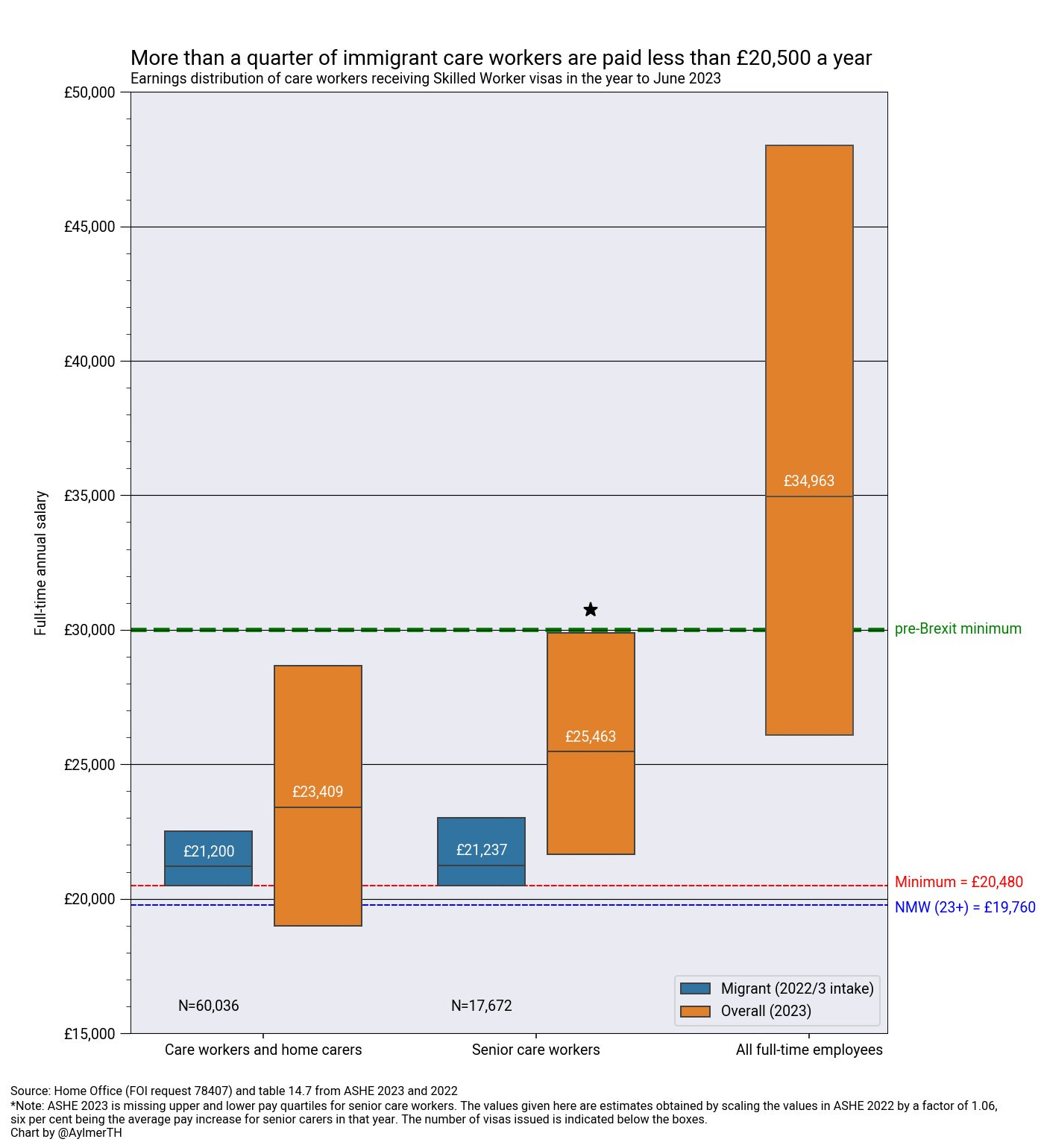The following essay was originally published on Courage Media. The audio narration is available exclusively here for Substack subscribers.
Still reeling from losing 187 seats and its sole council in May’s local elections, Britain’s Labour government has released a new immigration white paper, to purportedly make good on the previous Conservative government’s promise to “Take back control.”
Prime Minister Keir Starmer announced yesterday that his government will take the following measures to reduce net migration:
Skilled workers must now provide proof of university-degree-level (RQF 6) qualifications, and the salary threshold will be raised to an unspecified amount — with the Immigration Salary List, exempting some from thresholds, to be abolished.
The Health and Adult Social Care visa route will be eliminated; after the previous government issued 269,999 visas between 2021 - 2024, but failed to fill thousands of vacancies, and saw workers outnumbered by 377,135 of their dependents, all of whom were net-costs to the taxpayer.
Those who arrived legally on work, study, or visitor visas from countries including Pakistan, Nigeria, and Sri Lanka will no longer be able to apply for asylum while in Britain — as 40,000 did in 2024 alone. 47% of asylum claims, curiously, came from visa holders who were students nearing the end of their expiry date.
The ability for foreign students to remain in Britain after their graduation will be reduced from two years to 18 months.
The number of occupations on the Temporary Shortage List will be reduced, and ability to bring dependents restricted.
The standard qualifying period for Indefinite Leave to Remain (ILR) settlement grants will be extended to ten years, instead of five. Exemptions will be made “to reduce the qualifying period based on Points-Based contributions to the UK economy and society” — with a consultation planned on these changes for later in 2025.
Fluency in English will be a requirement for all visa holders and dependents.
Ministers will also bring forward legislation to amend the Immigration Acts 2002 and 2014 to redefine the “exceptional circumstances” under which asylum applicants can appeal to Article 8 of the European Convention on Human Rights (ECHR) and frustrate their Home Office deportation orders.
Starmer posted on X shortly before his press conference that “The Tories ran an immigration system that relied on cheap foreign labour instead of investing in British workers. That betrayal ends now.”
He refers to the three-fold rise in net migration which followed Brexit, after Boris Johnson’s government liberalised immigration laws against the advice of quango the Migration Advisory Committee. After setting the Skilled Worker visa salary threshold to less than the national median wage (£31,461) and lower than the minimum wage (£17,920) for new entrants, allowing primary recipients to bring limitless dependents, removing the requirement for foreign students to return home after completing their degree, and removing the requirement for British businesses to advertise jobs to British worker first, immigration soared to net 906,000 (gross 1.2 million) by 2023.
Starmer condemned how “Brexit was used for that purpose… To turn Britain into a one-nation experiment in open borders” in a speech last November.
In yesterday’s speech, Starmer told the press,
“Until in 2023, it reached nearly 1 million, which is about the population of Birmingham, our second largest city. That’s not control – it’s chaos.
“And look, they must answer for themselves, but I don’t think you can do something like that by accident. It was a choice. A choice made even as they told you, told the country, they were doing the opposite. A one-nation experiment in open borders conducted on a country that voted for control. Well, no more. Today, this [political content redacted] Government is shutting down the lab. The experiment is over. We will deliver what you have asked for – time and again – and we will take back control of our borders.”
But will they?
Shadow Justice Secretary Robert Jenrick alleges these measures will cut net migration by a meagre 50,000. Home Office analysis suggests they will reduce the number of foreign workers and students coming to the UK by 98,000 a year. Professor Brian Bell, chairman of the Migration Advisory Committee, said Labour’s white paper could cause net migration to fall “under 300,000 and probably closer to 250,000 in the next few years”. This is despite Home Office insiders’ estimation that net migration will rise from OBR projections of 315,000 – 400,000 per year to 525,000 every year.
With new net migration figures due to be released on 22 May, everyone is bracing themselves for news that Starmer has donned his lab coat to continue that one-nation experiment.
Starmer insisted during his speech that, “I am doing this because it is right, because it is fair, and because it is what I believe in”, but sceptics point to his record unpopularity as the real reason.
There is, of course, a strain of anti-migration protectionism in the socialist left, who oppose open borders for their diluting the price of labour, and placing downward pressure on the cost of housing and public services for the working class. But despite paying lip service to it yesterday, Keir Starmer has never been a part of it. In “Immigration Law and Practice” in 1988, Starmer wrote that a “racist undercurrent … permeates all immigration law.”
Last week, he brokered a contentious new trade deal with India, which exempts Indian migrants from paying the same National Insurance (healthcare and pensions) tax contributions that his government just raised for British workers; and which creates new visa routes for Indian chefs, musicians, and yoga instructors. Given Wetherspoon’s is Britain’s most popular curry vendor, we are not in dire shortage of New Delhi's cooks.
Starmer's Insane India Deal Sells Britain Down the Ganges
The following essay was originally published on Courage Media.
Even in yesterday’s announcement, Starmer couldn’t help but peddle the fiction that mass immigration is an inextricable part of British history:
“Migration is part of Britain’s national story. We talked last week about the great rebuilding of this country after the war; migrants were part of that, and they make a massive contribution today. You will never hear me denigrate that.”
Note the sole example that Keir Starmer can give is the HMT Windrush, which docked unexpectedly at Tilbury on 22 June, 1948. In the introduction to the white paper, it says,
“Immigration is important for Britain. For centuries people have come to this country to build a better life, contributing economically and culturally to our society and helping to rebuild our country after major shocks such as the Second World War.”
Our post-Macpherson Report antiracist mythology treats Windrush as the British equivalent of Plymouth Rock pilgrims, building settlements on a country reduced to rubble by the Blitz. But they were economic migrants, enticed to windswept England from the Caribbean by the promise of well-paying jobs as bus conductors; not self-sacrificing benefactors who wanted to rebuild Britain out of the kindness of their hearts. This history has since been rewritten to manufacture consent for unprecedented levels of migration, and the accommodation of foreign peoples and cultures as penance paid for the sins of racism, slavery, and empire.
If Starmer were to argue the anachronism that, before Windrush, Britain’s history was one of unbroken waves of migration, then he would have a hard time explaining how we have received more immigrants since the election of his mentor, Tony Blair, in 1997 than between the Battle of Hastings in 1066 and the end of the Second World War.
He would find himself in the absurd position of arguing, as critics of Renaud Camus did recently, that invading armies like the Norman conquest and Viking invasions are indistinguishable from the Windrush or Boriswave as “immigrants”. Those opposed to rapid demographic change, with no democratic mandate, may see it that way, but it isn’t the best sales pitch for its advocates to push.
Even so, Labour’s progressive window-dressing provides cover for their race to catch up to a new centre-ground on immigration. In the last month, Kemi Badenoch’s Conservatives committed to passing legislation to disbar the Human Rights Act (1998) and ECHR from all immigration cases — though not to repealing the Act, or leaving the ECHR. They also pledged to extend the qualifying period for ILR to 10 years, rather than the 15 recommended to them; and refused to restrict eligibility for ILR to persons of countries most likely to be net-tax contributors and culturally proximate to Britain. They did, however, restrict ILR to those who had been net-contributors during their stay, and who committed no crimes. Any migrants who arrive illegally, either by small boats across the Channel or overstaying a visa, would be automatically disqualified from claiming ILR even if their asylum claim was granted — leaving them open to the possibility of deportation. However, now that Labour have promised to do most of this, they have rendered the Tories’ offering obsolete. Perhaps this is a lesson in not playing things safe when politics now moves so fast.
Labour’s new English language requirement for visa recipients and dependents follows a long campaign by former-Reform, now independent MP, Rupert Lowe, who the cost of public sector translation services through Parliamentary questions. In 2023, the NHS spent £100 million on translation services; Jobcentres spent £3,420,480; and the Department for Work and Pensions spent £7.2 million explaining in 115 languages how Britain’s half-a-million foreign-born social housing and benefits claimants can gain more money from the taxpayer. Over £7.5 billion a year is spent on benefits paid to those born outside Britain.
When he first told “literally a communist” Ash Sarkar on BBC Politics Live, “I don't care, they should speak English”, and that all translation services should be scrapped, Lowe was met with screeching derision. Now, it’s Labour government policy. Not bad for the “Very Online Right”, eh?
Listen to this episode with a 7-day free trial
Subscribe to Tomlinson Talks to listen to this post and get 7 days of free access to the full post archives.
















